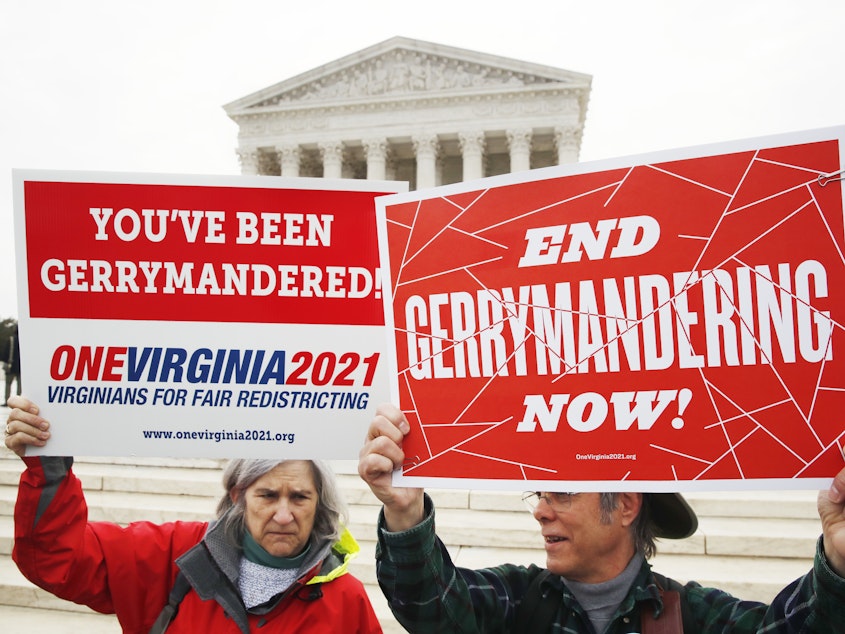Redistricting Guru's Hard Drives Could Mean Legal, Political Woes For GOP

The way Thomas Hofeller talked about redistricting — the drawing of political boundaries and the sifting of voters into buckets — you could be forgiven if you assumed he was speaking about a loved one or a favorite holiday.
Updated at 10:41 a.m. ET
"Redistricting is like an election in reverse! It's a great event," he said with a smile at a National Conference of State Legislatures event in 2000. "Usually the voters get to pick the politicians. In redistricting, the politicians get to pick the voters!"
A mapmaker and Republican strategist, he saw holes in the democratic system that could be exploited by technology and guile. Hofeller, who died in August 2018, saw a way to turn small vote margins into supermajorities for GOP legislators.
Now a trove of his data has been uncovered that could undo some of the work he spent decades perfecting.
Sponsored
The strategy
In North Carolina, after Republican successes in the 2010 election, Hofeller helped draw new maps that netted the party 10 of the state's 13 congressional seats, despite the popular vote in that state being nearly even.
Hofeller also knew the key to success in this niche field was protecting against lawsuits. He spent 10 PowerPoint slides in a presentation he gave about redistricting in 2011 just on legal issues and privacy.
"Treat every statement and document as if it was going to appear on the FRONT PAGE of your local newspaper," he implored on one slide. "Emails are the tool of the devil."
He knew the practice was unseemly, and if politicians were going to partake, Hofeller warned, they needed good lawyers. And a way to keep secrets.
Sponsored
"Loose lips sink ships," he said, at the same NCSL event in 2000. "Remember, a journey to legal hell starts with but a single misstatement."
All the more surprising, then, that his own files have prompted legal action.
After Hofeller's death, his daughter found hard drives and thumb drives holding close to 100,000 files, according to The New York Times. She turned them over to Common Cause, a voting-rights nonprofit.
The first hint at what they could contain came in a court filing last week.
Census case offers a sliver
Sponsored
An unpublished 2015 report, authored by Hofeller, concluded that adding a citizenship question to the 2020 census would produce data that would help redraw political maps "advantageous to Republican and Non-Hispanic Whites."
Plaintiffs in one of the New York-based lawsuits over the question also say that Hofeller later ghostwrote an early draft of the Trump administration's request for the question. A Justice Department spokesperson called that accusation "false."
The Trump administration has said it wants to add the question to help minority representation, even though Census Bureau research disputes that.
Ohio State law professor Daniel Tokaji says the Hofeller discovery is just another example of how the administration's justification doesn't hold up.
"It was not really, as they claimed, to get better enforcement of the Voting Rights Act so that Latinos could be fairly represented," said Tokaji. "In fact, there was a deliberate plan, and that plan includes the dilution of Latino votes and the enhancement of Republican voting strength."
Sponsored
The question now is, what else is in the newly uncovered files?
The data, as some have theorized, could potentially be useful in other partisan gerrymandering lawsuits that are floating around the country.
Attorneys for Common Cause said in court filings made public Thursday the Hofeller files reveal that Republicans in North Carolina made false statements to a federal court to avoid special elections in 2017.
Legislators repeatedly said districts that had been ruled unconstitutional couldn't be quickly thrown out because work on new ones had not yet begun. The newfound files, however, show that Hofeller had almost completely finished new maps at the time those statements were made.
Kathay Feng, the national redistricting director for Common Cause, wouldn't discuss what else is in the files because of ongoing litigation, but she spoke generally about the dangers of politicians drawing district lines that favor their own party.
Sponsored
"This is an American democracy, and we don't want a situation where, perhaps the best analogy is like Russia, where you have fake choices on the ballot," Feng said. "Where there is no such thing as true democracy, where your vote doesn't matter."
The public's view on "vote-stealing"
Public opinion about partisan gerrymandering is consistently negative. Last fall, voters in four states voted to reduce the role of elected officials in the redistricting process.
A Campaign Legal Center poll from earlier this year found that about two-thirds of likely 2020 voters view gerrymandering unfavorably.
Tokaji says the public getting a closer look at the unsavory details of Hofeller's work will only fuel those feelings.
"I think it's a little bit like the Wizard of Oz," he said. "It allows those of us who have not been in the backroom to see behind the curtain, and see the real partisan agenda behind some of these decisions."
The more the public knows and understands about the practice, the less brazen politicians may be when lines are redrawn in 2021.
For much of Hofeller's career, redistricting was considered a wonky practice that operated in the shadows of the political process.
"Redistricting is a very complex field, but I think it's a field which affects Americans a lot more than they understand," Hofeller said in 1991. "I define redistricting as the only legalized form of vote-stealing left in the United States today."
What remains an open question is exactly how much of his work will be undone by the data that have now come to light. [Copyright 2019 NPR]



